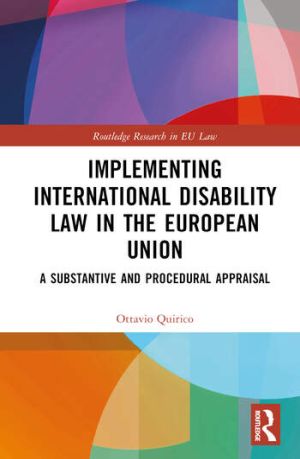
This book investigates the implementation of disability rights and duties in the European Union, aiming to understand its functioning and explore ways forward through a critical analysis of the Convention on the Rights of Persons with Disabilities (CRPD) within the context of international regulation.
Along the lines of the integration of fundamental rights within the common market, the EU has indeed progressively adopted meaningful regulation to advance disability rights, which are now essentially shaped by the CRPD. The research considers the interaction between law and policy at the international, EU and Member States’ level, focusing on three essential elements, including the sources of disability law, institutional mechanisms and substantive regulation. Grounded in the distinction between primary rules on law-making and secondary norms on enforcement, the analysis unfolds against the background of the ‘twin’ transitions on sustainability and digitalisation and encompasses the Council of Europe system, particularly in the light of the foreseeable accession of the EU to the European Convention on Human Rights. Arguably, following the progressive development it has facilitated in other regulatory areas, the Court of Justice of the European Union can provide a decisive contribution to advancing inclusiveness for people with disabilities in the Union.
The book is a useful resource for practitioners, policymakers, academics, students, researchers and anyone interested in EU and international disability law and politics.